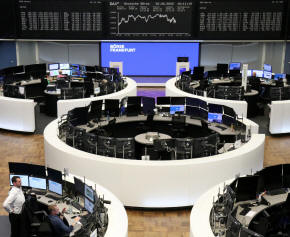Stocks slip as Australia rate hike heightens policy worries
 Send a link to a friend
Send a link to a friend
 [June 07, 2022] By
Danilo Masoni [June 07, 2022] By
Danilo Masoni
MILAN (Reuters) - World shares fell on
Tuesday and bond yields dipped from recent highs as a surprise
50-basis-point rate increase in Australia raised concern over policy
tightening ahead of U.S. inflation data and a European Central Bank
meeting this week.
The Reserve Bank of Australia (RBA) raised rates by the most in 22 years
and flagged more tightening to come as it battled to restrain surging
inflation, driving a brief spike in the Aussie and hitting local shares.
The MSCI's benchmark for global stocks < .MIWD00000PUS> fell 0.3% to 650
points by 1051 GMT, weighed by morning losses in Europe and earlier
weakness across Asian markets.
"As seen tonight with the surprise hike in Australia, most central banks
want a higher level of rates to cope with inflation. Policymakers want
to have some ammunition to use in case there is a slowdown in growth,"
said Enrico Vaccari, head of institutional sales at financial services
firm Consultinvest.

"Markets are in a phase of uncertainty that is bound to last. A
progressive increase in rates will have repercussions on volatility for
equities and even more on bonds," he added.
The pan-European STOXX 600 equity benchmark index fell 0.5%, while
derivative markets also pointed to a weak start late on Wall Street with
S&P 500 e-minis down 0.4%.
British Prime Minister Boris Johnson survived a no-confidence vote among
his Conservative Party's lawmakers on Monday, but the thin margin of
victory raised talk of a move to replace him, hitting sterling and
gilts.
"The vote casts significant doubt about his tenure as leader," said JP
Morgan economist Allan Monks.
"Assuming he can buy enough time, the outcome increases the chance that
fiscal policy is loosened further in an attempt to turn the situation
around. If not, he could yet be forced out with the Conservatives
electing a new leader (and hence prime minister)," he added.
The 10-year Treasury yield dipped 1.8 basis points (bps) in European
trade following six consecutive days of gains, but stayed above the key
3% threshold ahead of data on Friday expected to show still high
inflation.
A high reading could cement fears the Federal Reserve could keep raising
rates aggressively beyond the expected 50 bps increase at its upcoming
policy meeting next week.
In Europe, benchmark 10-year German bund yields also dipped by about 2
bps but held near Monday's highs ahead of the ECB meeting on Thursday
that is expected to confirm rate increases are coming soon. They last
traded at 1.303%.

[to top of second column] |

The German share price index DAX graph is pictured at the stock
exchange in Frankfurt, Germany, June 2, 2022. REUTERS/Staff

"There’ve been a couple of catalysts behind those moves higher, but a key one
over the last week and a half has been the perception that near-term recession
risks are fading back again, which in turn is set to give central banks the
space to continue hiking rates and thus take bond yields higher," said Deutsche
Bank strategist Jim Reid in a note.
"On top of that, the fact that recent inflation data has proven stickier than
expected has also pushed yields higher, and investors are eagerly awaiting to
see if we get another upside surprise from the US CPI reading out on Friday," he
added.
Meanwhile, 10-year gilt yields hit a fresh seven-year high at 2.265% and were
last almost flat on the day, as Johnson emerged weakened from the confidence
vote.
In foreign exchange markets, angst ahead of the U.S. inflation data kept the
dollar in demand. The dollar index was near a two-week high, up 0.15% on the
day.
The greenback rose to its the highest since 2002 against the yen and was last up
0.6% after Bank of Japan Governor promised support for the economy and easy
monetary policy even as prices start to rise.
Sterling fell 0.1% to $1.251 after hitting a three-week low. The euro dipped
0.15% at $1.067 as losses were limited by the possibility of a hawkish tone from
the ECB.

The Australian dollar gained as much as 0.76% just after the supersized RBA rate
hike, but quickly shed gains to trade flat on the day.
Oil prices fell in volatile trade as the market balanced risk sentiment with
supply concerns and the prospect of higher demand as China relaxes its COVID
curbs.
Brent futures fell 0.25% at $119.2 a barrel and U.S. West Texas Intermediate
futures were 0.2% lower.
The rise in U.S yields and the dollar sent gold to fresh one-week lows. The spot
price for the precious metal later recovered and was last up 0.4% at $1,849.38
per ounce.
Consultinvest's Vaccari said he expected a return of investor interest for gold
as a safe haven hedge against risks of stagflation.
(Reporting by Danilo Masoni and Tom Westbrook, additional reporting by Vidya
Ranganathan; Editing by Robert Birsel and Bernadette Baum)
[© 2022 Thomson Reuters. All rights
reserved.]This material may not be published,
broadcast, rewritten or redistributed.
Thompson Reuters is solely responsible for this content. |